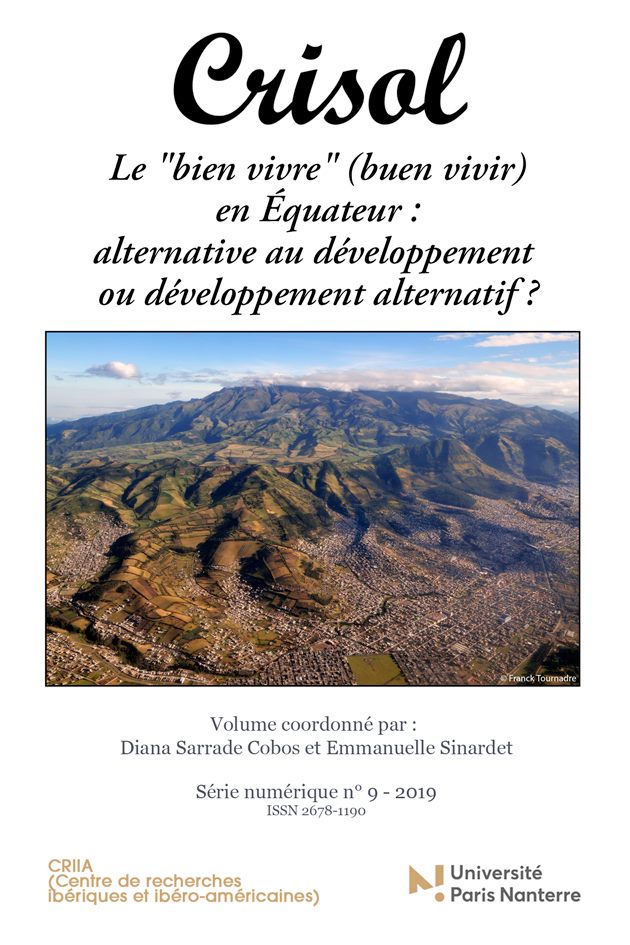El “Buen vivir” en Ecuador: etnogénesis, interacciones y transferencias discursivas entre lo glocal y lo nacional
Résumé
Le propos de cet article est d’analyser les interactions et les transferts discursifs entre les acteurs globaux, nationaux et locaux qui s'interrogent sur le “Bien Vivre” et le Sumak Kawsay en Équateur. Il analyse comment, au niveau “glocal” (Favre, 2009), des intellectuels ainsi que des citoyens du monde entier s’inspirent de ce paradigme en le promouvant en tant qu’alternative à la “crise civilisationnelle” et parviennent à le positionner dans le débat public de l’Équateur et de la Bolivie (Pleyers, 2010, 2014). Parallèlement, dans ces deux nations, des courants de tendance indianiste, écologique, altermondialiste, socialiste et « new age populiste » font appel au “Bien Vivre” en cherchant à le réinventer et à le résignifier. L'analyse du cas équatorien montrera dans quel contexte sociopolitique, à travers de quels discours le “Bien Vivre” est diffusé de « l’extérieur à l’intérieur » et vice-versa. Nous démontrerons comment il devient, à travers d’un “processus d’ethnogenèse” (Robin & Salazar, 2010), il devient le paradigme qui articule la Constitution Politique de 2008. Finalement, il identifie quelles disputes épistémiques et politiques émergent autour de cette notion. Le corpus d’analyse est constitué d'extraits de la presse, de projets et de manifestes politiques, de publications et de témoignages des acteurs, ainsi que de fragments de la littérature spécialisée.
Mots-clés : “Bien Vivre”/Sumak Kawsay ; ethnogenèse ; Révolution citoyenne ; glocal ; transferts discursifs.
En perspectiva histórica y construccionista, el propósito de este artículo es analizar las interacciones y “transferencias discursivas” entre los actores globales, nacionales y locales que reflexionan el “Buen vivir” y el Sumak Kawsay en Ecuador. Visibiliza cómo, en la esfera “glocal” (Favre, 2009), tanto intelectuales como ciudadanos del mundo entero se inspiran en este paradigma, promoviéndolo como alternativa a la “crisis civilizatoria”, logrando posicionarlo principalmente en el debate público de Ecuador y Bolivia (Pleyers, 2010, 2014). Paralelamente, en estas naciones, corrientes de tendencia indianista, altermundialista, socialista y “new age - populista” recurren al “Buen vivir”, buscando reinventarlo y resignificarlo. Al analizar el caso ecuatoriano, se evidencia en qué contexto sociopolítico, a través de qué actores y mediante qué discursos el “Buen vivir” es difundido de “afuera hacia adentro” y viceversa. Además, se demuestra cómo, mediante un “proceso de etnogénesis” (Robin & Salazar, 2010), llega a convertirse en el paradigma que articula la Constitución Política de 2008. Finalmente, se identifica qué disputas epistémicas y políticas emergen en torno a esta noción. El corpus de análisis está constituido por extractos de prensa, proyectos y manifiestos políticos, publicaciones y testimonios de los actores, y literatura especializada.
Palabras clave: “Buen vivir”/Sumak kawsay ; etnogénesis ; Revolución Ciudadana ; glocal ; transferencias discursivas.
The aim of this paper is to analyze the interactions and “discursive transfers” between both global and national actors regarding the notion of the “Good living” (“Buen vivir” or Sumak Kawsay) coined in Ecuador. From a historical and constructivist perspective, this briefing dwells on the appropriations and uses of this notion and new paradigm in the “glocal” domain (Favre, 2009), taken by intellectuals and citizens as means of promoting a new alternative to the “civilization’s crisis of capitalism”, mainly in Ecuador and Bolivia (Pleyers, 2010, 2015). At the same time, it shows how some currents of political thought —such as the ecologist, the indianist and the “new age-populist” streams— call this into question for the purpose of re signifying it. The Ecuadorian case highlights the main actors as well as the sociopolitical context in which the “Good living” discourse is divulged from the outside to the inside and viceversa. Also, it reveals the starting point of a new “agreement” based on this notion that will ultimately consolidate the New Political Constitution of the Republic of Ecuador (2008) —through “a process of ethnogenesis” (Robin & Salazar, 2010) — in contrast to the substantial divergences in its conception. Finally, this study permits an analysis of the political and epistemological disputes linked to the notion of “Good living”. The analysis is based upon several press excerpts, written projects and political manifestos, as well as testimonies by involved people and specialized published writings on the subject.
Key words : “Good living”/Sumak Kawsay ; ethnogenesis ; Citizen’s Revolution ; glocal ; discursive transfers.



